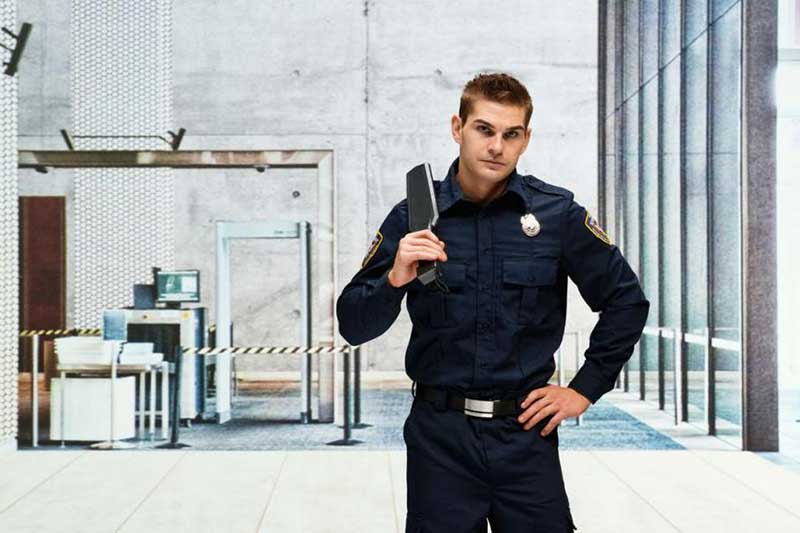In the field of criminal justice, the ability to communicate can make the difference in tense situations. Security guards and police officers must be expert communicators to maintain order, protect civilians and gather information that can help law enforcement catch criminals. Learning to communicate effectively also includes knowing how to detect signs of conflict, avoid and resolve them. Entering the police force or becoming a security guard gives you a chance to become a valuable member of your community.
Both verbal and written communication skills are vital to a successful career in criminal justice, and communication is taught in-depth as part of our vocational school’s training program.
What Is Good Communication?
The goal of communication is to send a message. In its simplest form, communication is the process of using your voice, written words, or body language to communicate something to someone else. Of course, we know that real-world communication is usually much more complex. People often say one thing but mean another, or their body language and mannerisms convey deeper feelings or thoughts they aren’t sharing.
Strong communicators are both expert speakers and listeners. They know how to choose the right words, tone, and approach for every situation. They can ask the right questions to resolve problems, reach goals and achieve positive results. In a jail or prison, communication promotes respect and cooperation from prisoners.
Here are some of the most important skills of good communication. These skills are known as interpersonal skills in training. They are a core part of any criminal justice curriculum.
Verbal Communication
Verbal communication is more than just knowing what to say. A verbal communicator must be confident in their words as well as receptive to their audience. Even in a position of authority, commanding respect requires being fully aware of how your audience is likely to respond.
Strategies such as paraphrasing, reflecting, and summarizing often prove invaluable. When you paraphrase someone’s words, you repeat what they said to clarify that you’ve heard them correctly. The goal is to make sure the person does not feel like you are being condescending or judging them. The real goal of paraphrasing is to build a level of trust between speakers and create a sense of understanding.
Reflecting is similar to paraphrasing. Whereas you restate what someone has said, but you may go a step further to include the emotions they’re feeling as well. A statement like, “You’re going through a lot right now, and you feel really stressed,” is an example of reflecting. Summarizing is a process of reviewing all the information that has been exchanged, then clarifying that both people are in agreement.
These are just a few verbal communication skills criminal justice professionals need to perform their jobs. Learning proper communication ensures that you can work confidently and know exactly how to confront a situation, even one that may be high-stress or rife with conflict.
Written Communication
Written communication accurately details events and relays descriptive information. Officers and guards must write reports and file them, so detail is imperative. Clear written communication has excellent spelling and grammar, uses the appropriate tone and is conscious of any biases that may influence the writing. In criminal justice, your job is to rely on facts to reach conclusions and make the right decisions.
Good written communication helps professionals incorporate the most accurate, appropriate information for their intended purpose. This could be writing a letter to a police chief, filing a report, or gathering information from suspects or witnesses.
Active Listening
Most people’s minds are on themselves in a conversation. Although they may hear what the other person says, they are more focused on what they’re going to say next. Active listening is the process of being fully conscious of another person’s words. Active listeners use various strategies to ensure the person they’re speaking with feels heard, understood, and respected. They are committed to sharing and exchanging information rather than demanding or judging. Active communication strategies include:
- Being aware of biases and withholding judgement.
- Clarifying what’s being said before responding inaccurately or unfairly.
- Summarizing information to ensure mutual understanding.
- Being physically present through eye contact and open body language.
- Responding routinely to affirm the other person you are listening.
Body Language
Police officers and security guards communicate with people who are often feeling tense, angry, or upset. Someone who has committed a crime may swear that they didn’t do it, but their body language will tell a different story. When trying to deescalate a situation, officers may look for nonverbal signs of building aggression and attempt to diffuse a situation before it becomes a problem.
Nonverbal cues in body language include physical posture, stance, tone of voice, eye contact, facial expressions and even distance between speakers. Knowing how to read these signs can help protect people and reveal the truth when it is being masked by false words.
Assertiveness
Assertiveness training is crucial in criminal justice because it helps professionals be more authoritative without causing unnecessary conflict. A police officer who is aggressively assertive can cause people to be more defensive or even act out against them. Rather than relying on intimidation tactics, assertive communicators know how to clearly state their wishes and expectations without making others feel ignored or disrespected.
Being assertive requires building your own confidence and trusting your words. Confident people naturally speak in a way that makes others trust them more. The benefit of assertiveness skills training is that it often helps people become more confident in the process.
What Are Some of the Other Skills Important in Criminal Justice?
Criminal justice professionals like police officers, prison guards and security guards all need to be physically fit and capable of apprehending suspects or diffusing physical aggression. They may often find themselves on the receiving end of someone’s frustration. Without the ability to run and easily defend themselves, they put their own lives and others at risk. With the right physical training, criminal justice professionals can easily perform their duties and protect people in the process.
Stamina and build are both important elements of physical wellness for criminal justice professionals. You must be able to run for an extended period of time, handle yourself physically against others and be capable of restraining people who may be larger or stronger than you.
A good criminal justice professional is also a critical thinker. They know how to truly listen to what someone is saying and determine whether an offender is being honest about their activities; they must quickly respond in conversation, ask for details and follow-up with questions that reveal the truth in a non-confrontational manner.
Where Do You Learn to Become a Criminal Justice Professional?
You may begin your career in criminal justice at a vocational school. By earning your diploma in criminal justice, you will be ready to enter the workforce in 9 months, working full-time. Our program can also help you earn a degree in criminal justice with an additional 6 months of study after you earn your diploma.
The detailed curriculum helps prospective criminal justice professionals learn all the vital skills they need to perform their duties well. Because these jobs often have a risk to personal safety, you can never be too prepared with communication and conflict resolution.
What Are the Benefits of Attending a Criminal Justice Program?
The greatest benefit to attending a vocational school program is the ability to enter the workforce as a qualified professional in under a year. Rather than spending four or more years in school, you learn all the knowledge and skills necessary to perform your role from real professionals.
Experienced Instructors
Experienced instructors are at the heart of our criminal justice program. We want you to learn from the best. No one is more equipped to teach aspiring officers than criminal justice professionals with experience. Students always have access to firsthand knowledge about what it’s like to be a police officer, to work in a prison and work in the different criminal justice professions. You can rely on your instructors to provide you with the most current knowledge in the field backed by years of real-world experience.
Job Variety
The opportunity to learn about different types of jobs in criminal justice can help you decide on a career path. You may know that you’re passionate about the field, but you haven’t decided the right job for you yet. Being able to learn about the positions from people who have worked them will allow you to make a more informed choice about your future. You can also speak to your instructors one-on-one, ask them questions and collaborate with career services to find your match.
Diploma to Degree
The degree path in criminal justice is another benefit to studying for your diploma at ATA College. While the diploma program does prepare you for work, you may decide that you want additional educational qualifications. After you have completed your diploma, you have the choice to add an additional six months of advanced training to earn a degree. This degree can open more career opportunities, prepare you for work in a particular role or help you specialize in an area of criminal justice.
Is Criminal Justice a Good Career?
For someone who wants to serve and protect others, a career in criminal justice is an excellent choice. In various paths, you have the opportunity to help people correct unhelpful behaviors, avoid bad decisions and work toward a better life. In some roles, your job is to maintain order and keep civilians safe.
Whether you want to be on the streets as a police officer or work as a security guard, criminal justice has many opportunities for you to make a difference.
Want to Learn More?
Our mission at ATA College is to provide diploma and associate degree training for entry-level positions in specialized fields. Our goal is to assist you in learning new skills and/or enhancing previously obtained skills, through higher education. We strive to fulfill your needs in seeking employment in our community. We are committed to providing a quality education that instills core values which will develop work ethics, professionalism, honor, and integrity, giving you a competitive edge through any economic condition.
Criminal Justice & Public Safety Diploma
After completing the 9-month diploma program at our El Cajon | San Diego criminal justice school, students have the option to continue with courses in the Associate of Science program. The criminal justice associate degree is available in multiple emphasis pathways and can be completed in an additional 6 months after general education courses.
Contact us today to learn more about criminal justice career opportunities offered at ATA College.





